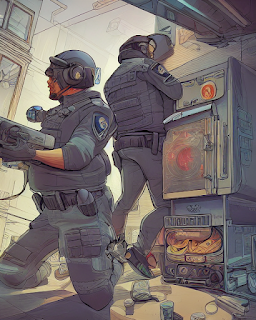It's rare for a federal appellate court to reverse a district court's denial of a motion to suppress evidence—the evidence must be viewed in the light most favorable to the government. But on Friday, the Sixth Circuit reversed suppression denials twice.
First, in a published decision, United States v. Loines, the Sixth Circuit found that police officers violated the Fourth Amendment when searching a vehicle. Officers suspected Mekhel Rivers of distributing drugs and obtained a search warrant for his house. While executing the warrant, officers saw Rivers's suspected vehicle parked on the street nearby. A detective walked up to the passenger side of the car and, through a tinted window, allegedly saw a cigar wrapper, "a folded piece of paper," and a small plastic bag that the officer claimed was "a bag of dope."
The defendant, Aaron Loines, was in the residence being searched. He told officers the keys to the vehicle outside were his. The vehicle was towed and searched without a warrant, revealing drugs. The government defended the search on grounds of the "plain view doctrine" and the "automobile exception" to the Fourth Amendment.
The Sixth Circuit concluded that officers had no valid reason to search the vehicle. In rejecting the plain view argument, the court concluded that, even though the officer claimed to have seen a bag of dope, objective evidence from photographs and body cameras did not substantiate his claim. The court stated: "Simple statements from the officers
contending that they saw 'a bag of narcotics' in the car are not enough to establish that an object
was in plain view when the screenshots that the government presented contradict the officers’
statements." Further, the court decided that, even assuming the officer could actually inside the car through the tinted windows, what he saw—cigar wrappers, folded paper, and a plastic bag—were not intrinsically incriminating.
The court then quickly dispatched with the government's automobile-exception argument. For that exception to apply, the officers needed to have probable cause to believe the vehicle contained evidence of a crime, and the officers' evidence here came only from their purported plain-view observations, which the court had already rejected as a basis for the search. The Sixth Circuit thus vacated Mr. Loines's conviction and remanded.
The second decision, unpublished, United States v. Grant, reaffirmed the Sixth Circuit's precedent that officers cannot search a house just because a suspected drug dealer rents it and visits it frequently. The case involved a search warrant that stated that Marlon Grant had visited a particular residence numerous times, for short periods of time, and that he rented it. The affidavit also stated that a confidential informant had conducted a controlled buy from Grant, though it did not say that it happened at the residence.
In finding the warrant failed to establish probable cause, the Sixth Circuit emphasized that the affidavit never alleged Grant dealt drugs from the address, or that he entered the building just before or after the controlled buy. The court also rejected later warrants as fruit of the poisonous tree.

No comments:
Post a Comment